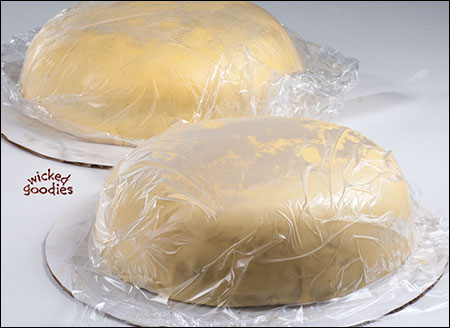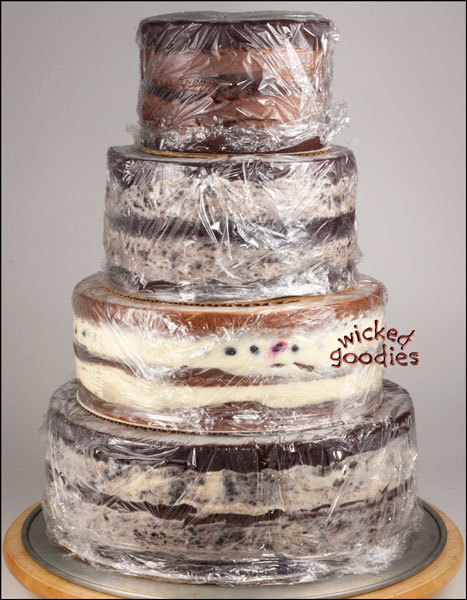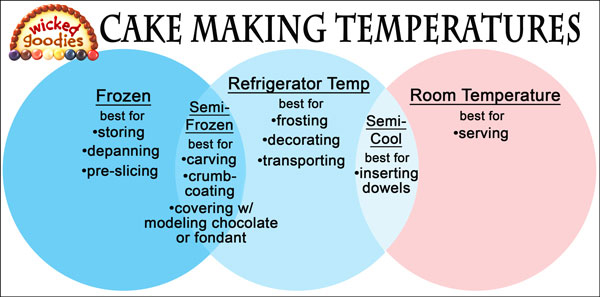Cake Frosting Basics
page 29 of 50
The Freezer vs. the Refrigerator
It’s a myth that freezing cakes is bad. In fact the opposite is true, because every extra unnecessary day that a cake sits in a refrigerator results in a staler product. The same goes for bread, which also keeps better in a freezer than it does in a fridge.

Hamburger cake “buns” wrapped in a combination of fondant and modeling chocolate, sealed in plastic wrap
Leaving un-decorated cakes exposed to the elements for too long is usually the real reason for stale-tasting cake. Make sure to seal a cake in plastic wrap between the stages of handling.
I once worked in a wholesale bakery with a giant walk-in sub-zero freezer that was dedicated entirely to assembled 6″ and 7″ layer cakes. They were stored piled up like pucks, each sealed in plastic wrap. Half of the inventory of cakes was stored like that, waiting to be thawed and decorated to fulfill bulk orders. Those cakes would last for months in great condition because there were no other flavors mingling in that freezer besides cake. They were excellent quality cakes too with flavors like chocolate pecan torte and hazelnut dacquoise. You would never have guessed they’d been frozen.
Storing a cake in a home freezer alongside frozen fish, raw meat, pungent, spicy, or garlicky foods risks cross-contamination of flavor. If frozen meat is present in your freezer, be sure that goes under the cake, not above it. The less cake-friendly the freezer, the shorter shelf life that a frozen cake will have in it.
One trick to help keep a frozen cake fresh is to build it in the pan using my cake filling method, then freeze it in the pan sealed well in plastic wrap. The pan, provided you can spare it, helps protect a cake from the harsher elements of the home freezer environment.
The freezer helps make a cake cold and hard so that it can withstand being carved, shaped and frosted without falling apart. It’s easier to manipulate a cake when it’s cold, especially when it’s large or highly contoured cake. Remember to leave extra time for the cake to thaw to refrigerator temperature.
Don’t use the freezer again after you’ve started frosting a cake unless you are in an extreme hurry. There are two reasons for this. #1, the extreme climate change from a cold freezer to warm room temperature causes condensation to form on the cake’s surface, making it damp or beaded with moisture, which interferes with frosting and decorating. #2, temperature fluctuations cause a cake to expand and contract, which may crack a frosted surface. Therefore the freezer should only be used sparingly – if at all – during the later stages of frosting and decorating.
Chronology of Cake Making Temperatures
- Freeze an unfinished cake for several days or weeks to preserve its freshness.
- De-pan a cake when it’s frozen.
- Pre-slice a cake for neat single servings or samples when a cake is still frozen.
- Carve a topsy turvy cake or sculpted cake when it is semi-frozen.
- Crumb coat a cake, especially a large wedding cake tier or contoured cake when it is semi-frozen.
- Frost a cake with buttercream or ganache when it is refrigerator cool.
- Add wood dowels or supports to the inside of a cake when it is semi-cool (just after frosting, before chilling).
- Add decorations to a cake once it is refrigerator cool again.
- Stack or transport a cake when it is refrigerator cool.
- Serve a cake when it is room temperature. It takes 2-4 hours for a cake to go from refrigerator to room temperature depending on its size.
page 29 of 50





